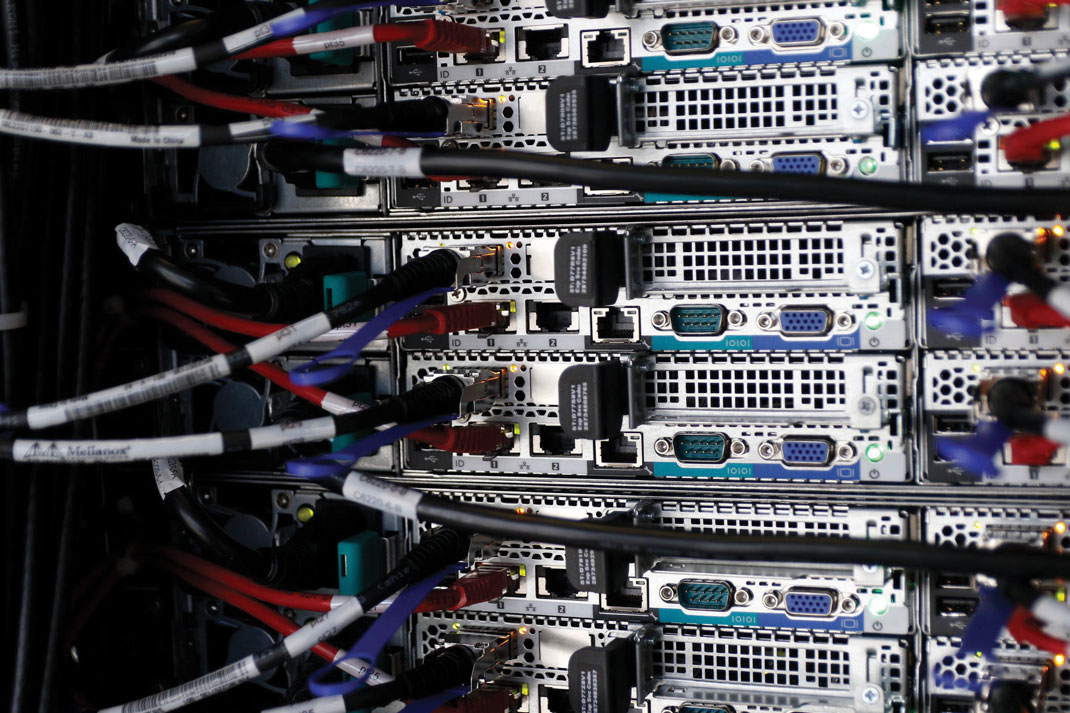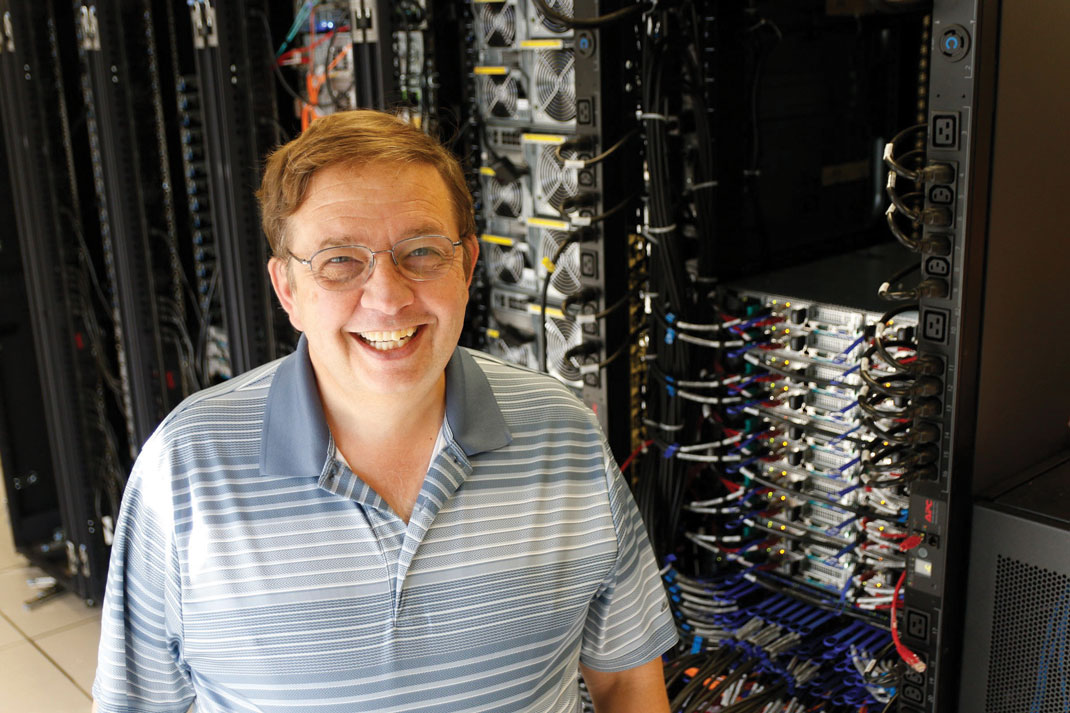Hope Klug has a question: What drives the astounding diversity of life found across the planet?
It's the kind of question that fascinates a biologist like Klug. So she and her colleagues at the University of Tennessee in Chattanooga opened that scientific can of worms and peered in "to answer really big-picture questions related to ecology, evolution, and climate change," says Klug, associate professor in the Department of Biology, Geology and Environmental Science. "This project has allowed us to study biological patterns across all scales of life."
First, though, they had to tackle another major issue. A gigantic amount of research already is out there, so it must be sifted through. But there's so much information the project could slow to a snail's pace simply by the amount of necessary reading.
They turned to UTC's SimCenter, whose high-speed, high-capacity computers can bore quickly through mountains of data. At the same time, the computers learn as they go along, finding new connections, new questions, new answers. The ability is called machine learning but it's better known as artificial intelligence, or A.I.
"What machine learning does for you is help you become a better scientist. It doesn't remove your brain from the process; it helps you to look and look deeper and find things that weren't obvious," says Tony Skjellum, director of the SimCenter.
SimCenter at a glance
› Name: Center of Excellence in Applied Computational Science and Engineering› Location: 701 East M.L. King Boulevard, adjacent to the UTC campus› Started: Sim Center was started at Mississippi State University and relocated to the University of Tennessee at Chattanooga in 2003› Facilities: With its 31,000-square-foot facility, the Sim Center includes computer rooms, research facilities, an 80-seat auditorium, a research library and faculty offices.› Director: Dr. Anthony Skjellum› Staff: Nearly 20 faculty members, researchers and support staff› Mission: Research and doctoral training in computational engineering
It's only recently that the center's equipment has been updated to the point where it's capable of such technological magic.
"Up until this past year, we didn't have the tools to analyze truly large data sets," Klug says. "The skills and resources that we've gained by collaborating with the SimCenter have allowed both of us to ask much broader and more important biological questions."
Arms open wide
"C'mon over."
If Skjellum had a single message, that's it. Like a proud papa, he wants everyone to see what the SimCenter has to offer. His invitation is not just for the world at large, although local, national and international companies and organizations often use the center's technology. He also wants UTC faculty to understand what's on their campus and free of charge.
"We are a research accelerator," he explains. "We help professors and students accomplish their goals in research and, for students, that's also experiential learning."
There's a general perception that the SimCenter's computers are a resource only for engineering and computer science projects, but that's not even close to the truth.
"Computational biology is where things are headed in our fields," Klug says.
Along with her biology project, faculty in the Gary W. Rollins College of Business are crunching numbers from Twitter; the Department of Physical Therapy is finding ways to predict athletic injuries; the center also is part of the ongoing reconfiguration of UTC's campus-wide Information Technology system.
It's understandable, however, that many see the SimCenter as a resource for engineering and computer science since it has worked on such projects with the city of Chattanooga, TVA, Volkswagen, Oak Ridge National Laboratory and the U.S. Department of Defense. The center used its computer simulation abilities to help local trucking company U.S. Express make their 18-wheeler cabs and trailers more aerodynamic and fuel-efficient.
It also is deeply involved in developing cybersecurity systems to protect computer grids and networks from hackers. Skjellum came to UTC from Auburn University, where he was director of the Cyber Research Center, so cybersecurity is in his wheelhouse.
"We recently did a tech briefing for the Pentagon, telling all the good stuff that's going on in research and development, coupled with all the stuff that might be interesting to them," Skjellum says.
It also has been a key player in the Smart City project designed to make the city's public transportation, electric grid, traffic flow, utilities and other systems more efficient, less costly and safer. The initiative recently was moved under the umbrella of the newly created Center for Urban Informatics and Progress.
But the center's computers and classrooms and conference rooms and auditorium are available for anyone at UTC, Skjellum points out. The center can even help find seed money for some projects.
"So use the computers and other items in SimCenter to do initial research that you can then take to organizations like the National Science Foundation and Oak Ridge to get funding and grant money," he says.
Follow the money
Unlike UTC faculty and students, however, non-UTC agencies must pay.
"We're not allowed to work for free because we're a state entity, but that doesn't mean we can't give some free advice," Skjellum says. "Generally speaking, we're going to make sure there's a financially fair relationship."
Some professors work with outside companies or organizations and, because dealing with contracts is not something they often do, the SimCenter can step in.
"Sometimes faculty undersell their value," Skjellum explains. "It's hard to always get funding from the federal government, so we're always looking for ways to get new income. We say, 'We'll show you the solution,' but we're going to try to make sure that happens in a much smarter way each time one of those relationships gets started."
UTC also can benefit if SimCenter-based research leads to a technical innovation that can be sold commercially, he say. Before work even starts, a contract may be signed that says UTC gets a cut of any money or patent generated from research.
"We don't do work-for-hire if we can possibly avoid it," Skjellum says. "We say, 'We'll do that for you, but if we invent that we still need a field-of-use license because we brought hundreds of years of background intellectual property knowledge to that discussion."
Scrubbing data
Hemant Jain, the W. Max Finley chair in business, free enterprise and capitalism management in the College of Business, is using the SimCenter on two projects, both of which are examining data that, without the center, would come in oceans of information too vast to swallow.
One project is scrubbing data from Twitter posts, targeting users in the medical field who create an "informal network" of information sharing, Jain says. SimCenter computers will examine around 1 million tweets to understand the types of information and medical knowledge available on this network, he says.
A second project will plow through data posted across the internet by patients sharing information with others suffering from similar medical conditions, Jain says. The hope is to connect these patients with physicians to broaden the scope and availability of possible treatments worldwide, he explains.
Having the SimCenter's massive computing power and storage abilities on campus makes both projects "much easier," Jain says.
"Our goal is to make sure that the resources are here so professors who already know how to do that can do it. There are always people who know exactly what they want to do and we're making that easier to do," Skjellum says.
But others need help fully utilizing all benefits of the software or analyzing the data generated by the computers, so the center also offers technical advice. That's one of the perks for Gary Wilkerson, graduate-school instructor in athletic training and health and human performance. He's in the early stages of research to prevent athletic injuries by determining whether a person is more or less inclined to hurt themselves unintentionally.
The amount of data generated by the project's experiments will be "massive," he says, and they'll need both the SimCenter's technological abilities and real, live assistance.
"We need people who have the expertise to do big data analytics; we need machine learning to maximize the predictive accuracy," Wilkerson adds.
Shawn Ryan is an executive staff writer in the communications and marketing office at the University of Tennessee at Chattanooga.


